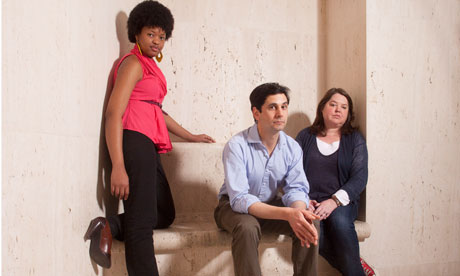
Harriet Lane
The idea for her first novel came to Harriet Lane in a flash one Sunday in May 2010. "The plot just fell into my head, quite complete. When I dropped the kids off to school on Monday I took the laptop out to the garden where there was no Wi-Fi and started writing." She wrote a first draft in just 11 weeks. "It was so much unbelievable fun. I had this weird confidence about it and I just blitzed it."
That confidence shines through on every page of Alys, Always (to be published by Weidenfeld), a gripping thriller set in the London literary world. It begins with a car crash on an icy English road and a death which turns, slowly and unnervingly, into an opportunity for the narrator Frances Thorpe, a lowly subeditor on a newspaper books desk, to insinuate herself into the upper echelons of London literary life.
Lane has firsthand experience of Frances's world, having worked as a subeditor for Tatler before going on to edit and write for the Observer, the Telegraph and Vogue. But in 2008 her journalistic career came to an abrupt halt when she nearly lost her sight. She was diagnosed with a chronic inflammation of the optic nerve and put on medication which even now "just about manages the condition".
Unable to do her job properly, she decided on a whim to join a creative writing course. The decision paid off. "My life is quite difficult at the moment, but little bombs of joy keep going off." When I meet her at the British Library, she has just received the cover art for the American edition of Alys, Always and she's thrilled with it. She hasn't planned a follow-up. "I've got quite good at not thinking too far ahead, but when I get some space, fingers crossed, I'd like to try this again."
Chibundu Onuzo
As a final-year history student at King's College London, 20-year-old Chibundu Onuzo must juggle lectures, essay deadlines and writing her dissertation. But she has something else on her plate too – promoting her debut novel.
The young Nigerian writer impressed the literary world when she signed a two-book deal with Faber in February last year, the youngest woman ever to do so.
Onuzo's book, The Spider King's Daughter, follows a pair of Lagos teenagers, a well-to-do girl called Abike and a young street hawker, as their relationship blossoms.
"It's just interesting, how people from different classes relate to each other," Onuzo says. "Abike should relate to the hawker in the same way as she relates to her driver. But the hawker is good-looking, and speaks English well, and that makes her pause."
Growing up in Lagos, the youngest daughter of two doctors, Onuzo started writing on a whim, aged 10. She typed stories on the family computer, influenced by the American TV shows she watched at home.
"It wasn't seen as something abnormal, in the sense that they [my parents] didn't discourage me," she says. "But at the same time, they didn't go, 'Our daughter's writing a book! That's amazing!' I think that would have been equally very harmful."
Her imagination began to turn to Nigeria when she moved to England to do her GCSEs. "When you're removed from Lagos, you realise that there are a lot of interesting things to write about."
Encouraged by her older sister, she sent 33 pages of The Spider King's Daughter to three agents. Capel & Land recognised her potential and asked for the rest, which took her 10 months to write. Numerous redrafts later and it's ready to hit bookshops in March.
"As a Christian I believe it's just the grace of God," she says, reflecting on her success so far. "All things work together for good."
Faramerz Dabhoiwala
For Philip Larkin, famously, sexual intercourse began in 1963, and this has become something close to a prevailing view of our times. But the 42-year-old historian Faramerz Dabhoiwala decided to dig a little deeper and, after a decade of research, the result is his radical and enthralling debut The Origins of Sex, published in February. Here we discover that the "first sexual revolution" can be dated to the 18th century; even our prurient interest in the sex lives of celebrities can be traced to this time with the rise of media-savvy courtesans such as Kitty Fisher, who gazes out seductively from the book's front cover.
"I've always been interested in cultural differences in attitudes to sex," says Dabhoiwala, whose day job is teaching history at Exeter College, Oxford. "That may be because I grew up in Amsterdam in the 1970s and 1980s and then I moved back to England in Mrs Thatcher's heyday to go to university, so that was a little bit of a contrast. Most of my family live in India and they have particular attitudes to sexuality. So I have always been attuned to the subject and then I had the luck of stumbling across this huge unexplored, unexplained revolution in behaviour and I just pursued it."
Dabhoiwala hopes that The Origins of Sex, with its mix of juicy anecdotes and rigorous analysis, will appeal to everyone from schoolchildren to academics and he is thrilled to have lighted on such a populist subject. "I modestly hope it will change the way that people think about sex," he says. "I could also say that people should read it because it will almost certainly improve their sex lives, but even if it doesn't it'll still be a really good read."

